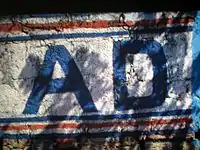Democratic Alliance (Portugal)
The Democratic Alliance (Portuguese: Aliança Democrática, AD) was a centre-right conservative political alliance, in Portugal, between the Social Democratic Party (PPD/PSD), the Democratic and Social Centre (CDS) and the People's Monarchist Party (PPM) existing between 1979 and 1983. After its official dissolution, the coalition was still revived in local elections after 1989 and presented lists across the country in every single local election after 2001.
Democratic Alliance Aliança Democrática | |
|---|---|
 | |
| Abbreviation | AD |
| Founded | 5 July 1979 |
| Dissolved | 1983 (Repeated in later years in local and other elections.) |
| Ideology | Liberal conservatism Reformism Christian democracy |
| Political position | Centre-right |
| International affiliation | Iberian links to UCD, ‘Mesa Iberoamericana de Partidos Democráticos’ (only PSD and CDS, 8–11 November 1979, little de facto existence)[1] and 'Reunión Iberoamericana de Partidos de Centro Derecha' (9 November 1979 to 1981, little de facto existence)[2][3] |
| Colours | Blue, Orange |
| Party flag | |
 | |


The coalition was also revived in the Azores only to contest the 2022 elections. The coalition won two seats. The coalition is expected to also be on the ballot in the next Azorean elections.
History
The alliance was composed of the Social Democratic Party (PSD), the Democratic and Social Centre (CDS) and the People's Monarchist Party (PPM), including also a group of dissidents of the right wing of the Socialist Party (PS) who were disappointed by the previous Soares government, called The Reformers, including José Medeiros Ferreira (who would later rejoin the PS), António Barreto (who remained a more or less centre/rightwing aligned independent) and Francisco Sousa Tavares (who joined the Social Democratic Party afterwards). The coalition was first formed in 1979 in order to run to the December 1979 legislative election. The alliance was led by Francisco Sá Carneiro and Freitas do Amaral, and won the 1979 and 1980 legislative elections, which led to Sá Carneiro becoming Prime Minister of Portugal, but lost the presidential election of 1980 to the independent candidate António Ramalho Eanes.
After the death of Sá Carneiro on 4 December 1980, the coalition was unable to find a leader with his charisma. Francisco Pinto Balsemão, the incoming PSD leader, became Prime Minister, but was unable to consolidate the support enjoyed by his predecessor. After its defeat in the municipal elections of 1982, it was disbanded in 1983.
Marcelo Rebelo de Sousa led an attempt to establish a new Democratic Alliance in 1998, between the PSD and the People's Party (CDS–PP; the former CDS), led by Paulo Portas. It contested the 2004 European elections as Força Portugal, but was subsequently dissolved. However, both the PSD and CDS–PP later agreed to contest the 2014 European elections under a joint list called the Portugal Alliance.
The Democratic Alliance was revived in the Azores only to contest the 2022 elections. The coalition polled second with 34% of the votes and elected 2 MPs to Parliament.[4]
Members of the Democratic Alliance
- Social Democratic Party, (PSD)
- Democratic and Social Centre, (CDS)
- People's Monarchist Party, (PPM)
- The Reformers
Leaders
- Francisco Sá Carneiro : 1979 – 1980
- Diogo Freitas do Amaral (interim) : 1980 – 1981
- Francisco Pinto Balsemão : 1981 – 1983
Election results
Assembly of the Republic
Between 1979 and 1983
| Election | Leader | Votes | % | Seats | +/− | Government |
|---|---|---|---|---|---|---|
| 1979 | Francisco Sá Carneiro | 2,719,208 | 45.3 (#1) | 128 / 250 |
New | Majority |
| 1980 | 2,868,076 | 47.6 (#1) | 134 / 250 |
Majority |
After 1983 (only in Azores)
| Election | Leader | Votes | % | Seats | Government |
|---|---|---|---|---|---|
| 2022 | Paulo Alexandre | 28,330 | 33.9 (#2) | 2 / 6 |
Opposition |
2024 Azores regional election
| Election | Leader | Votes | % | Seats | Government |
|---|---|---|---|---|---|
| 2024 | José Manuel Bolieiro | TBD | TBD | 0 / 57 |
TBD |
Local elections
Between 1979 and 1983
| Election | Votes | % | Councillors | +/- | Mayors | +/- | Assemblies | +/- | Parishes | +/- |
|---|---|---|---|---|---|---|---|---|---|---|
| 1979 | 1,044,642 | 23.5 (#2) | 426 / 1,900 |
New | 73 / 305 |
New | 2,122 / 9,703 |
New | 9,785 / 40,110 |
New |
| 1982 | 988,347 | 19.9 (#3) | 322 / 1,909 |
49 / 305 |
1,625 / 9,897 |
7,684 / 41,636 |
After 1983 (Only in contests where PSD, CDS-PP and PPM ran in a joint coalition.)
| Election | Votes | % | Councillors | +/- | Mayors | +/- | Assemblies | +/- | Parishes | +/- |
|---|---|---|---|---|---|---|---|---|---|---|
| 1989 | 193,161 | 3.9 (#5) | 13 / 2,002 |
New | 1 / 305 |
New | 41 / 6,753 |
New | 403 / 33,000 |
New |
| 2001 | 67,094 | 1.3 (#9) | 10 / 2,044 |
1 / 308 |
40 / 6,876 |
302 / 34,569 |
||||
| 2005 | 91,455 | 1.7 (#8) | 20 / 2,046 |
1 / 308 |
73 / 6,885 |
400 / 34,498 |
||||
| 2009 | 99,811 | 1.8 (#9) | 17 / 2,078 |
1 / 308 |
60 / 6,946 |
405 / 34,672 |
||||
| 2013 | 94,015 | 1.9 (#9) | 21 / 2,086 |
2 / 308 |
72 / 6,487 |
453 / 27,167 |
||||
| 2017 | 75,192 | 1.5 (#9) | 15 / 2,074 |
2 / 308 |
42 / 6,461 |
250 / 27,005 |
||||
| 2021 | 70,904 | 1.4 (#11) | 32 / 2,064 |
3 / 308 |
96 / 6,448 |
412 / 26,790 |
Presidential elections
| Election | Candidate | 1st round | |
|---|---|---|---|
| Votes | % | ||
| 1980 | António Soares Carneiro | 2,325,481 | 40.2 (#2) |
| 2016 | Marcelo Rebelo de Sousa | 2,413,956 | 52.0 (#1) |
References
- The Christian Democrat International, Roberto Papini, collection "Religious forces in the modern political world", Rowman and Littlefield, 1997, p. 201
- Entre los Autoritarismos de Castro y Pinochet – LA CUMBRE CENTRISTA EN MADRID PUEDE ABRIR UNA TERCERA VIA POLITICA PARA IBEROAMERICA, Pedro J. Ramirez, ABC de Madrid, 10 November 1979
- OREJA INAUGURA LA CUMBRE DE CENTRISTAS IBEROAMERICANOS, 10 November 1979
- "Resultados Globais". Ministry of Internal Administration (in Portuguese). Retrieved 2 February 2022.